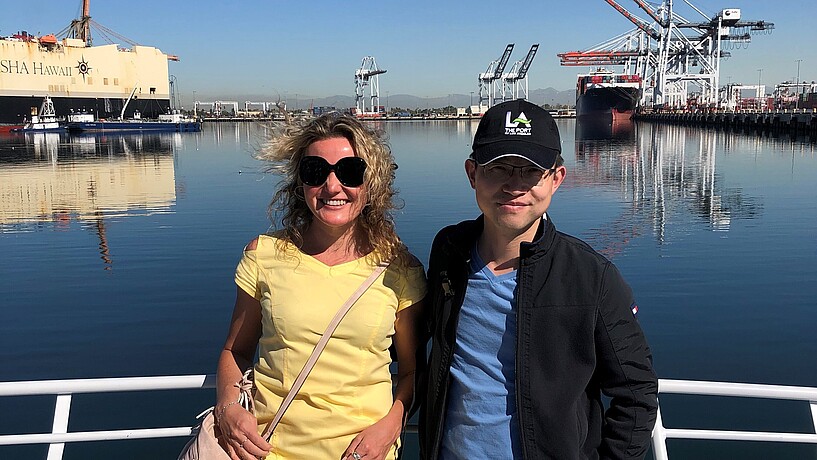The original GAIW format saw US and German students participating in week-long workshops in Hamburg (May) and Long Beach (October) led by faculty members from both universities. Looking at different business topics, they participated in lectures and company visits, whilst working on projects in mixed teams. As travel became impossible, the business schools switched from in-person to online workshops. This allowed the participating faculty to extend the traditional workshop framework – initially to seven weeks of class during the summer semester of 2021 and then to nine weeks in the winter semester of 2021. It is also enabled two Spanish universities to join as guests.
Prof. Ming Chen (CSULB - photo right): 'This class brings students together across national boundaries and provides a unique opportunity for students to interact with industry experts and tackle practical business problems. It enhances their cultural competency and team-work skills and prepares them well for an increasingly more interconnected global business world.'
The new COIL class in winter semester 2021/22 focused on competitive port clusters in times of exogenous shocks – in this case COVID-19, as well as the related implications for the Port of Hamburg (Germany), the Port of Los Angeles (USA), the Port of Long Beach (USA), the Port of Santander (Spain), and the Port of Las Palmas (Spain). It consisted of asynchronous academic lectures as well as synchronous academic events that included lectures by guest corporate speakers and port authorities, Q&A sessions with faculty as well as the final presentations of the student projects. 48 students were put into eight international teams and worked collaboratively on dedicated class assignments. The students were enrolled and worked with class materials via BeachBoard, the CSULB e-learning platform.
Prof. Natalia Ribberink (HAW Hamburg - photo left): 'This intercontinental COIL class connects international students – physically located in 3 different time zones – in virtual online teams. For many this is their first real-life experience of scheduling and committing to international project tasks and deadlines. The direct collaboration with industry experts and company representatives enables access to primary data and opens up opportunities for networking.'
Most importantly, the COIL module is integrated into the curriculum at both business schools. At CSULB it is an elective in the International Business programme headed by Prof. Ming Chen, and at HAW Hamburg it is a component of the 'International Organisation and Cooperations' lecture taught by Prof. Dr. Natalia Ribberink. Up to 2021 the GAIW was an extracurricular workshop. Through the COIL format, the participating students receive a grade and are awarded credit points for their degree programme. They also receive a virtual badge from CSULB and a global business certificate.
Florian Sylvester, business student at HAW Hamburg, describes the COIL class as one of the highlights of his studies, thanks to its engaging nature combined with the international focus. 'Dealing with a current global issue – in our case Covid-19 and its effect on port competitiveness – makes previous theoretical knowledge more tangible. The exceptional keynotes by port representatives as well as participating in discussions with students from all over the world was very refreshing.'
(Text: Ingrid Weatherall)

